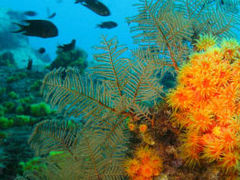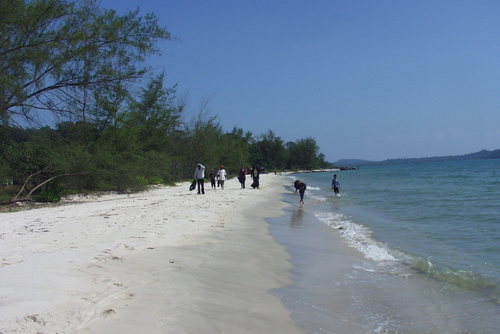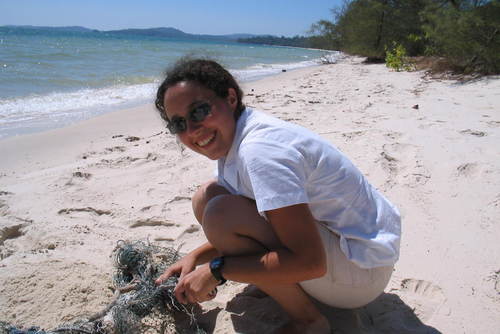As you explore the exotic seascape around the island you will be getting involved in a real, ongoing conservation project. You will be helping to discover and chart the health of extensive areas of coral, record populations of fish, and survey the huge diversity of inter-tidal animals - from tiny hermit crabs to pastel-hued anemones.
On shore you'll learn about the activities of the traditional island fishermen, as well as discovering and reporting which marine organisms are being sustainably harvested and which are being dangerously depleted. You’ll also be helping to investigate the long term effects of global warming on Cambodia’s corals.
The work you’ll carry out will be rewarding, challenging, and hugely beneficial to conservation efforts, as well as being fantastic fun. You will gain immense satisfaction from knowing that your input will help to protect this precious marine wilderness for future generations.
WHAT DOES THE PROJECT DO?
The aim of the Frontier-Cambodia island beach conservation project is to better understand the country’s marine resources, and to provide teaching and training to local island communities to enable them to make informed decisions regarding the management of their coastal ecosystems.
To achieve this mission, you will conduct scientific baseline data surveys of reef areas, including mapping the health of the reefs. We also identify patterns of resource use, and we work with local communities to support environmentally responsible development.
Some of Cambodia’s corals were recently damaged by a bleaching event caused by high sea temperatures. Global warming is believed to be to blame, as well as the new development upon the mainland. Your project aims to chart the extent of this damage and to monitor how the reefs are recovering. We hope that this information will help to support management of damaged coral reefs around the world.
The island itself is little studied and the local people are keen to be involved in protecting their biodiversity, making this a perfect location for both research and practical conservation activities. You could have the opportunity to work on all sorts of tangible conservation and research, both land-based and marine. As well as marine work, you could be doing bird counts or vegetation surveys, or you might have the chance to join the local community rangers as they patrol the island and protect its resources. You will also have the chance to teach the local children of the island due to the poor economy of the island , some do not get the chance to learn English , after this not only will you feel very rewarded but will help the locals in later life.
WHAT WILL I BE DOING?
The project’s work aims to provide local stakeholders, research organisations and government bodies with the information they need to design and implement management plans for the future protection of key marine and terrestrial ecosystems.
To gather the data needed you will be snorkelling to locate and map the extensive coral reefs and study their various wildlife communities. You will also explore and record the organisms that inhabit the inter-tidal zones and the island's inland areas. To do this you will deploy a wide range of newly learned research skills and scientific techniques including: underwater visual census of reef and commercial fish such as triggerfish and parrotfish, assessment of algal and coral cover to determine the extent of coral bleaching and damage, and line intercept transects for benthic life and indicator invertebrates such as nudibranchs. You will record observations of the feeding habits and behaviour patterns of a range of marine and terrestrial life. You may even get to study the impact of artisanal fishing on the coral reefs or report the effects of global warming on marine communities.
Whilst snorkelling, you'll see an extraordinary array of animals from stunning angel fish to the shy porcupine fish, sea cucumbers to feathery starfish, spiny urchins to octopus and seahorses. By the end of your project you will be expert at identifying hundreds of colourful and patterned reef fish as well as being an experienced and competent snorkeler. Although the work is intense and challenging you'll get immense satisfaction from having survived and from having made a valuable contribution to the conservation of this precious marine wilderness. You will return home with the new friends you've made and a wealth of fascinating stories and memories.
As well as taking part in snorkelling and marine conservation work you’ll help with scientific data entry and daily camp maintenance, taking turns to cook, tidy and clean the camp, rinse snorkel kit, collect firewood, collect and treat water, and help with a wide variety of other essential camp duties.
You'll find your team to be a fun, dynamic mix of ages and experiences, with members who all share a passion for travelling in developing countries and saving endangered wildlife. Your staff will be young, friendly individuals who are highly experienced in their field and may have volunteered on a Frontier project earlier in their career.




